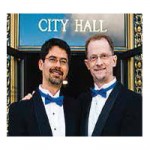 By Stuart Gaffney and John Lewis
By Stuart Gaffney and John Lewis
With this year’s theme of San Francisco Pride, “A Celebration of Diversity,” we are thrilled to celebrate a great leap forward in the worldwide marriage equality movement: last month’s legal victory in Taiwan that will make the nation the first in Asia to have marriage equality. “I’m leaping with joy like a bird,” exclaimed Taiwanese LGBTQ activist Chi Chia-wei, one of the parties to the suit, who was has been fighting for the right to marry for over 30 years, according to the Agence France-Presse (AFP). His words reawaken the joy that we and millions of others experienced during Pride two years ago when marriage equality became the law of the land across America.
The victory in Taiwan is particularly exciting for us as a biracial Chinese American family. We remember participating thirteen years ago in the Gay Asian Pacific Alliance’s historic marriage equality float in the San Francisco Chinese New Year Parade, the first of its kind in any Chinese New Year parade in the world, beamed to television audiences across Asia. Our float boldly proclaimed that the Chinese symbol of marriage, double happiness 囍, should be available to all. We are delighted to see that vision starting to become a reality in Asia itself.
We and Asian LGBTQ activists hope that the victory in Taiwan will have ripple effects across the continent. “This will have a huge impact on mainland China. Next stop, Hong Kong, then mainland proper,” proclaimed a Chinese social media user, as reported by Radio Free Asia. Although Taiwan and China differ politically, they share deep cultural and familial roots. Ray Chan, Hong Kong’s first openly gay lawmaker, told AFP that he could foresee Hong Kong couples going to Taiwan to try to marry and then returning home and pressing the government for recognition of their relationships.
Japanese activist friends also welcomed the news, noting the importance of marriage equality becoming a reality “not only in western countries but also in Asia.” Vuong Kha Phong, a Vietnamese LGBTQ advocate proclaimed the Taiwan decision “a historic victory for the LGBT groups in Asia,” and looked to the decision to build “momentum to mobilize the community to take action” as Vietnam will reconsider its marriage laws in 2020, according to the AFP.
The language and reasoning of the Taiwan Constitutional Court’s historic decision itself is very strong. In an official press release, the Court proclaimed Taiwan’s exclusion of same-sex couples from marriage “obviously a gross legislative flaw.” The Court highlighted how Chi Chia-wei had been appealing to different branches of the government for the right to marry for “more than three decades.” It concluded that “after more than a decade” of the legislature being “unable to complete its legislative process on those bills regarding same-sex marriage,” the time was up.
The Court found that denying same-sex couples the ability to marry violated lesbian, gay, and bisexual people’s fundamental constitutional freedom “to decide ‘whether to marry’ and ‘whom to marry,’” a choice “vital” to “human dignity.” The Court also made an expansive ruling with respect to sexual orientation discrimination, holding that the Constitution’s equality guarantees required “heightened” judicial scrutiny of differential treatment based on sexual orientation, and that the marriage exclusion could not withstand such scrutiny. By applying “heightened” scrutiny explicitly, the Taiwan court went further than the U.S. Supreme Court has, and it is past time for the American court to take this critical step.
The Taiwan Court gave the legislature and other responsible authorities two years to comply with the ruling and “discretion” as to “the formality … for achieving the equal protection of the freedom of marriage” for same-sex couples. We and Taiwanese LGBTQ activists believe that full marriage equality is the only way to achieve this result. If the legislature fails to act in two years, same-sex couples will be able to marry under current procedures.
According to the AFP, Chi Chia-wei was jailed for five months after filing his first petition for the right to marry, back in 1986. That was the same year the U.S. Supreme Court held that states could imprison LGBTQ people for the physical expression of their love. Today, both countries’ highest courts have ruled in favor of marriage equality. Chi told the AFP that he has “been able to carry on for so long” because he “wasn’t discouraged by the setbacks.” He said: “My belief is that if you can do one right thing in this life, it’s all worth it.”
As our community continues to pursue full LGBTQ freedom and equality on both sides of the Pacific, we take inspiration this Pride season from Chi’s optimism and perseverance and the collective work of countless other Taiwanese LGBTQ activists. They remind us all that we are “doing the right thing” and “it’s all worth it.”
John Lewis and Stuart Gaffney, together for over three decades, were plaintiffs in the California case for equal marriage rights decided by the California Supreme Court in 2008. Their leadership in the nationwide grassroots organization Marriage Equality USA contributed in 2015 to making same-sex marriage legal nationwide.
Recent Comments